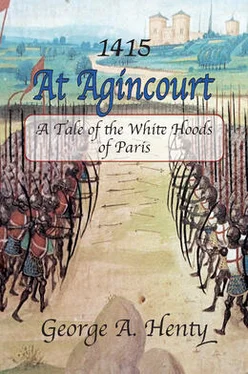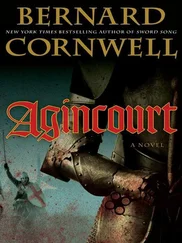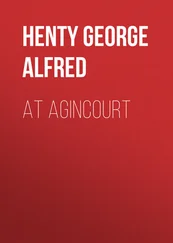AT AGINCOURT
BY G. A. HENTY
PREFACE
The long and bloody feud between the houses of Orleans and Burgundy—which for many years devastated France, caused a prodigious destruction of life and property, and was not even relaxed in the presence of a common enemy— is very fully recorded in the pages of Monstrellet and other contemporary historians. I have here only attempted to relate the events of the early portion of the struggle—from its commencement up to the astonishing victory of Agincourt, won by a handful of Englishmen over the chivalry of France. Here the two factions, with the exception of the Duke of Burgundy himself, laid aside their differences for the moment, only to renew them while France still lay prostrate at the feet of the English conqueror.
At this distance of time, even with all the records at one's disposal, it is difficult to say which party was most to blame in this disastrous civil war, a war which did more to cripple the power of France than was ever accomplished by English arms. Unquestionably Burgundy was the first to enter upon the struggle, but the terrible vengeance taken by the Armagnacs,—as the Orleanists came to be called,—for the murders committed by the mob of Paris in alliance with him, was of almost unexampled atrocity in civil war, and was mainly responsible for the terrible acts of cruelty afterwards perpetrated upon each other by both parties. I hope some day to devote another volume to the story of this desperate and unnatural struggle.
G. A. HENTY.
CHAPTER I. A FEUDAL CASTLE
“And is it true that our lord and lady sail next week for their estate in France?”
“Ay, it is true enough, and more is the pity; it was a sad day for us all when the king gave the hand of his ward, our lady, to this baron of Artois.”
“They say she was willing enough, Peter.”
“Ay, ay, all say she loved him, and, being a favourite with the queen, she got her to ask the king to accede to the knight's suit; and no wonder, he is as proper a man as eyes can want to look on—tall and stately, and they say brave. His father and grandfather both were Edward's men, and held their castle for us; his father was a great friend of the Black Prince, and he, too, took a wife from England. Since then things have not gone well with us in France, and they say that our lord has had difficulty in keeping clear of the quarrels that are always going on out there between the great French lords; and, seeing that we have but little power in Artois, he has to hold himself discreetly, and to keep aloof as far as he can from the strife there, and bide his time until the king sends an army to win back his own again. But I doubt not that, although our lady's wishes and the queen's favour may have gone some way with him, the king thought more of the advantage of keeping this French noble,—whose fathers have always been faithful vassals of the crown, and who was himself English on his mother's side,—faithful to us, ready for the time when the royal banner will flutter in the wind again, and blood will flow as it did at Cressy and Poitiers.
“The example of a good knight like Sir Eustace taking the field for us with his retainers might lead others to follow his example; besides, there were several suitors for our lady's hand, and, by giving her to this French baron, there would be less offence and heart-burning than if he had chosen one among her English suitors. And, indeed, I know not that we have suffered much from its being so; it is true that our lord and lady live much on their estates abroad, but at least they are here part of their time, and their castellan does not press us more heavily during their absence than does our lord when at home.”
“He is a goodly knight, is Sir Aylmer, a just man and kindly, and, being a cousin of our lady's, they do wisely and well in placing all things in his hands during their absence.”
“Ay, we have nought to grumble at, for we might have done worse if we had had an English lord for our master, who might have called us into the field when he chose, and have pressed us to the utmost of his rights whenever he needed money.”
The speakers were a man and woman, who were standing looking on at a party of men practising at the butts on the village green at Summerley, one of the hamlets on the estates of Sir Eustace de Villeroy, in Hampshire.
“Well shot!” the man exclaimed, as an archer pierced a white wand at a distance of eighty yards. “They are good shots all, and if our lord and lady have fears of troubles in France, they do right well in taking a band of rare archers with them. There are but five-and-twenty of them, but they are all of the best. When they offered prizes here a month since for the bowmen of Hants and Sussex and Dorset, methought they had some good reason why they should give such high prizes as to bring hither the best men from all three counties, and we were all proud that four of our own men should have held their own so well in such company, and especially that Tom, the miller's son, should have beaten the best of them. He is captain of the band, you know, but almost all the others shoot nigh as well; there is not one of them who cannot send an arrow straight into the face of a foe at a hundred and twenty yards. There were some others as good who would fain have been of the party, but our lady said she would take no married men, and she was right. They go for five years certain, and methinks a man fights all the better when he knows there is no one in England praying for his return, and that if he falls, there is no widow or children to bewail his loss. There are as many stout men-at-arms going too; so the Castle of Villeroy will be a hard nut for anyone to crack, for I hear they can put a hundred and fifty of their vassals there in the field.”
“We shall miss Sir Aylmer's son Guy,” the woman said; “he is ever down at the village green when there are sports going on. There is not one of his age who can send an arrow so straight to the mark, and not many of the men; and he can hold his own with a quarter-staff too.”
“Ay, dame; he is a stout lad, and a hearty one. They say that at the castle he is ever practising with arms, and that though scarce sixteen he can wield a sword and heavy battle-axe as well as any man-at-arms there.”
“He is gentle too,” the woman said. “Since his mother's death he often comes down with wine and other goodies if anyone is ill, and he speaks as softly as a girl. There is not one on the estate but has a good word for him, nor doubts that he will grow up as worthy a knight as his father, though gentler perhaps in his manner, and less grave in face, for he was ever a merry lad. Since the death of his lady mother two years ago he has gone about sadly, still of late he has gotten over his loss somewhat, and he can laugh heartily again. I wonder his father can bear to part with him.”
“Sir Eustace knows well enough that he cannot always keep the boy by his side, dame; and that if a falcon is to soar well, he must try his wings early. He goes as page, does he not?”
“Ay, but more, methinks, as companion to young Henry, who has, they say, been sickly from a child, and, though better now, has scarce the making of a stalwart knight in him. His young brother Charles is a sturdy little chap, and bids fair to take after his father; and little Lady Agnes, who comes between them, is full of fire and spirit.
“Yes; methinks Guy will have a pleasant time of it out there; that is, if there are no fresh troubles. I doubt not that in two or three years he will be one of our lord's esquires, and if he has a chance of displaying his courage and skill, may be back among us a dubbed knight before many years have passed over our heads. France is a rare place for gaining honours, and so it may well be, for I see not that we gain much else by our king's possessions there.”
Читать дальше












